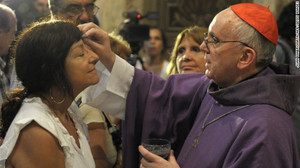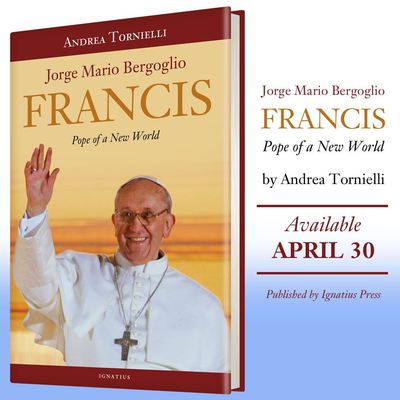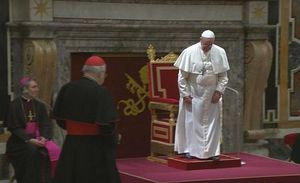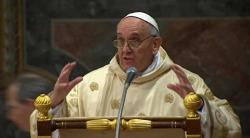This is THE funniest thing I’ve seen on Pope Francis and the cardinals thus far…Brandon Vogt’s humor refreshes…in Pope Francis in Motion.
Tag: Pope Francis
Pope Francis: What is your Lenten Gesture of Solidarity?
An English Translation of Cardinal Bergoglio’s Lenten Letter 2013
And rend your hearts, and not your garments, and turn to the Lord your God: for he is gracious and merciful, patient and rich in mercy, and ready to repent of the evil. (Joel 2:13)
Little by little we become accustomed to hearing and seeing, through the mass media, the dark chronicle of contemporary society, presented with an almost perverse elation, and also we become [desensitized] to touching it and feeling it all around us [even] in our own flesh. Drama plays out on the streets, in our neighborhoods, in our homes and — why not? — even in our own hearts. We live alongside a violence that kills, that destroys families, that enlivens wars and conflicts in so many countries of the world. We live with envy, hatred, slander, the mundane in our heart.
Continue reading Pope Francis: What is your Lenten Gesture of Solidarity?
Pope Francis: “Mercy is the Lord’s most powerful message.”
At his first praying of the Angelus and address, the Holy Father told the crowd of 300K this experience.
The Pope “told a story, of an elderly widow he encountered during a Mass for the sick celebrated in connection with a visit of the image of Our Lady of Fatima. “I went to confession during the Mass,” he said, “and near the end – I had to go to do confirmations afterward, and an elderly lady approached me – humble [she was] so very humble, more than eighty years old. I looked at her, and said, ‘Grandmother,’ – where I come from, we call elderly people grandmother and grandfather – ‘would you like to make your confession?’ ‘Yes,’ she said – and I said, ‘but, if you have not sinned…’ and she said, ‘we all have sinned.’ [I replied], ‘if perhaps He should not forgive [you]?’ and, sure, she replied, ‘The Lord forgives everything.’ I asked, ‘How do you know this for sure, madam?’ and she replied, ‘If the Lord hadn’t forgiven all, then the world wouldn’t [still] be here.’ And, I wanted to ask her, ‘Madam, did you study at the Gregorian (the Pontifical Gregorian University, founded in 1551 by St Ignatius Loyola, the oldest Jesuit university in the world)?’ – because that is wisdom, which the Holy Spirit gives – interior wisdom regarding the mercy of God. Let us not forget this word: God never tires of forgiving us,” he repeated, “but we sometimes tire of asking Him to forgive us.” Pope Francis went on to say, “Let us never tire of asking God’s forgiveness.”
Source: Vatican Radio
Pope Francis: God has the ability to forget
The Pope offered Mass for the Fifth Sunday of Lent today in the parish church of the Vatican, Saint Anne’s. In the picture Francis is seen with Pietro Orlandi, the brother of Emanuela who disappeared in 1983; the Orlandi family were parishioners of Saint Anne’s and she sang in the choir, the father was an employee of the Vatican bank. Emanuela is presumed dead. The homily was unscripted but Vatican Radio offered this summary.
Pope Francis said, “If we are like the Pharisee before the altar, [who said], ‘Thank you, Lord, for not making me like all the other men, and especially not like that fellow at the door, like that publican…,’ well, then we do not know the heart of the Lord, and we shall not ever have the joy of feeling this mercy.” Pope Francis went on to say, “It is not easy trust oneself to the mercy of God, because [His mercy] is an unfathomable abyss – but we must do it!” Pope Francis continued, “He has the ability to forget, [which is] special: He forgets [our sins], He kisses you, He embraces you, and He says to you, ‘Neither do I condemn you. Go, and from now, on, sin no more.’ Only that counsel does He give you.” Pope Francis concluded, saying, “We ask for the grace of never tiring of asking pardon, for He never tires of pardoning.”
Francis comments Giussani: on saying Yes to Christ
Pope Francis commenting on Monsignor Giussani:
“When people say to Fr. Giussani, “How brave one has to be to say ‘Yes’ to Christ!” or, “This objection comes to my mind: it is evident that Fr. Giussani loves Jesus and I don’t love Him in the same way,” Giussani answers, “Why do you oppose what you think you don’t have to what you think I have? I have this yes, only this, and it would not cost you one iota more than it costs me…. Say “Yes” to Jesus. If I foresaw that tomorrow I would offend Him a thousand times, I would still say it.” Thérèse of Lisieux says almost exactly the same thing: “I say it, because if I did not say ‘Yes’ to Jesus I could not say ‘Yes’ to the stars in the sky or to your hair, the hairs on your head…” Nothing could be simpler: “I don’t know how it is, I don’t know how it might be: I know that I have to say ‘Yes.’ I can’t not say it,” and reasonably; that is to say, at every moment in his reflections in this book, Giussani has recourse to the reasonableness of experience.”
Francis: Pope of a New World by Andrea Tornielli
Francis: Pope of a New World by Andrea Tornielli
“Francis, rebuild my Church!” That is how St. Francis of Assisi heard the call of Christ. It is also how Jorge Mario Bergoglio, at the age of 76, and a Jesuit, seems to have accepted his election to the papacy with the choice of a name that no other pope has ever chosen.
Who is Pope Francis, elected in one of the shortest conclaves in history? Who is the man chosen to be the first pope from the Americas and the first Jesuit pope?
Continue reading Francis: Pope of a New World by Andrea Tornielli
Articles on or about Pope Francis
Ecumenical and Interfaith leaders respond to the election of Pope Francis
Surveying what the ecumenical crowd has to say about this papal election is mixed at best. Time will tell about our interfaith friends, namely the Jewish and Muslim communities. It is said that Pope Francis has had very strong friendships with the Jewish community of Argentina.
On Wednesday night when Pope Francis was introduced to the world on the loggia he said, “And now let us begin this journey, the bishop and people, this journey of the Church of Rome which presides in charity over all the churches, a journey of brotherhood in love, of mutual trust. Let us always pray for one another. Let us pray for the whole world that there might be a great sense of brotherhood.”

Pope Francis Portrait Painting (Photo credit: faithmouse)
His All Holiness the Ecumenical Patriarch Bartholomew (of Constantinople) will attend the enthronement of the newly-elected Pope of Rome on March 19. This is the first time since 1054 that Orthodox bishops will be in attendance. Bartholomew will be accompanied by the Metropolitan of Pergamum, John (Zizoulas), the Metropolitan of Buenos Aires, Tarasios (a native of San Antonio, Texas) and the Metropolitan of Italy, Gennadios.
The Russian Orthodox Church’s Department for External Relations, Metropolitan Hilarion of Volokolamsk, spoke on Thursday that he thought a meeting between the Pope Francis and Patriarch Kirill of Moscow was “possible but the place and timing will depend on how quickly we will overcome the consequences of the conflicts from the turn of 1980s and 1990s.” Hilarion notes, “on several occasions, Pope Francis has shown spiritual sympathy towards the Orthodox Church and a desire for closer contacts.” The Orthodox still refuse to accept the fact that some Christians in the Byzantine East want, in their own freedom, be in communion with the bishop of Rome. Tensions run high when it comes to thinking about the Ukrainian Byzantine Church using the title of Patriarch for their head and the existence of Latin Catholic dioceses in Russia.
Continue reading Ecumenical and Interfaith leaders respond to the election of Pope Francis
Pope Francis speaks to the cardinals: the Paraclete is the supreme protagonist of every initiative; never give in to pessimism, to bitterness
The Church needs reform, as always, a personal conversion. Turning to Jesus Christ is an act of freedom. What baggage do we have that would prevent change, or hinder me from confessing and living differently as a Christian? Reform starts not with institutional works, but with oneself. Governance is not the only issue that we have to be vigilant of with this new papacy; conversion of life starts locally and spreads. As Francis said yesterday in his first Mass as the Bishop of Rome, we need to walk, to build, to confess with, for and by each and every person so that we see the glory of God. We need to untie the knots that were spoken of by Saint Ireneaus. All this talk of reform includes the Curia, it is not business as usual. The Pope will remind us and lead us by his own life. He now holds office as the Vicar of Christ. He has suffered much close to To that end, today Pope Francis spoke to the gathered cardinals in the Sala Clementina. His address follows.
This period of the Conclave has been filled with meaning not just for the College of Cardinals but also for all the faithful. During these days we have felt almost palpably the affection and solidarity of the universal Church, as well as the attention of many people who, even if not sharing our faith, look upon the Church and the Holy See with respect and admiration.
From every corner of the earth a heart-felt chorus of prayer was raised by Christian peoples for the new Pope, and my first encounter with the crowds filling St. Peter’s Square was an emotional one. With that eloquent image of a praying and joyful populace still fixed in my mind, I would like to manifest my sincere gratitude to the Bishops, priests, consecrated persons, young people, families, and to the aged for their spiritual closeness which is so touching and sincere.
Pope Francis’ first homily as the Bishop of Rome
In these three readings I see that there is something in common: it is movement. In the first reading, movement is the journey [itself]; in the second reading, movement is in the up-building of the Church. In the third, in the Gospel, the movement is in [the act of] profession: walking, building, professing.
Walking: the House of Jacob. “O house of Jacob, Come, let us walk in the light of the Lord.” This is the first thing God said to Abraham: “Walk in my presence and be blameless.” Walking: our life is a journey and when we stop, there is something wrong. Walking always, in the presence of the Lord, in the light of the Lord, seeking to live with that blamelessness, which God asks of Abraham, in his promise.
Continue reading Pope Francis’ first homily as the Bishop of Rome




![Bergoglio with Don Giacomo Tantardini in a photo from 2009 [© Paolo Galosi].jpg](https://communio.stblogs.org/assets_c/2013/03/Bergoglio with Don Giacomo Tantardini in a photo from 2009 [© Paolo Galosi]-thumb-250x152-13958.jpg)


